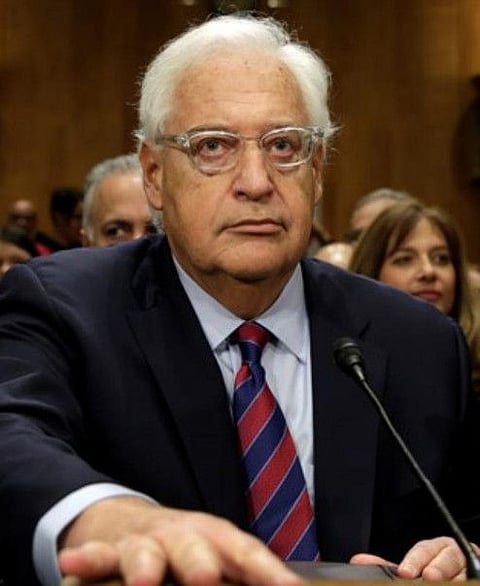David Friedman’s cruel joke on Palestinians
Notwithstanding its inadequate medical infrastructure, Palestinians are fighting Covid-19

You heard the one about the bankruptcy lawyer turned America’s top diplomat in Israel, a man whose soul is imbued with empathy for Palestinian refugees? No? Wonder why. The joke is hilarious and has been making the rounds for the last two weeks.
So here it goes. On April 15, David Melech Friedman, America’s ambassador to Israel, announced grandiosely that he was behind arranging for a grant of as much as $5 million (Dh18.36 million) to the Palestinians in the occupied territories, aimed at helping them fight the coronavirus pandemic.
Now here’s the punchline. “I am very pleased the USA is providing $5 million for Palestinian hospitals and households to meet immediate, life saving needs in combating Covid-19”, Friedman wrote on Twitter. “The USA, as the world’s top humanitarian aid donor, is committed to assisting the Palestinian people”.
Palestinians by now know how to take punches. And, no, there’s no danger that they will follow the recommendation advanced by President Trump, from the White lectern, during one of his ribald, two-hour marathon press conferences last Thursday, and start ingesting bleach as a cure for the virus
OK, dear reader, stop doubling up with laughter. Jokes, as Sigmund Freud showed us in his 1905 ground-breaking study of humour, Jokes and Their Relation to the Unconscious, are a serious matter. What is Friedman up to here?
Is he, unable to cow Palestinians with threats, now trying to confuse them with a one-two punch? It was Friedman, you see, who tirelessly lobbied the administration in 2018 to cut all aid to Palestinians, a move widely seen then as a vindictive effort to punish them for pre-emptively rejecting the White House’s so-called Deal of the Century.
A bizarre 181-page “peace plan” which gave Israel a wish list of its long-held expansionist demands.
The cuts resulted, among other things, in a deterioration of the Palestinian health system, including already underfunded East Jerusalem hospitals, leaving authorities unprepared to deal with the challenges of the pandemic in the occupied territories.
Jared Kushner, then the big honcho behind the Deal of the Century, asserted smugly — picking up facts and figures seemingly off the top of his head — that “Palestinians have gotten more aid than any group of people in history”. (In may last year, Washington Post fact checker Glenn Kessler debunked the claim in his column.)
Critical projects
The United States had previously provided $300 million a year to the United Nations Relief and Works Agency (UNRWA), money used for critical projects, such as food assistance, health care, education and social services.
“The cuts were the biggest and most severe in our [organisation’s] history”, then head of UNRWA, Pierre Krahenbul, said at the time. Soon after that, the US Agency for International Development (USAID) ceased all assistance to Palestinians, amounting to roughly $270 million, slated for health and education projects.
Even before the cuts, Palestinians, like other impoverished communities around the world, often relied on cheap, fatty, high-calorie foods, which often led to an increase in obesity — then to diabetes.
The prevalence of diabetes among Palestinian refugees under Israeli occupation is 18 per cent, one of the highest in the world. (In Israel the figure is 7.2 per cent.) Among its many complications, the disease reportedly weakens, and many cases entirely suppresses the immune system.
Today it can spiral out of control when combined with an infection such as coronavirus, rendering victims’ chance of dying triple that of the general population.
The connection between deprivation and the prevalence of disease, as Brian Wispelwey and Amaya Al Orza pointed out in an April 18 piece in the London Review of Books, should not be underestimated.
In the United States itself, for example, diabetes is twice as common among needy Americans, such as African Americans living in ghettos, as among others.
In the West Bank and Gaza, territories with a feeble, underfunded health system (the West Bank has 120 ventilators in public hospitals for 3.2 million people and fewer still for the two million in Gaza), it is a case of the fire next time — that is to say, the toll of an outbreak in these territories could be catastrophic should Covid-19 reach the scale there currently seen in Europe and the United States.
Videos and pamphlets
Still, Palestinian activists are not sitting on their behinds. And here I quote at length from the splendid piece by Wispelwey and Al Orza. “Palestinians in camps have resorted to community based responses to protect themselves”, they wrote.
“Popular committees and local organisations have taken the lead, and in some cases employees have donated their salaries to cover the costs of campwide Covid-19 prevention measures. In Aida and Azza camps in Bethlehem, young refugees [originally] trained as community health workers (CHWs) to fight the diabetes epidemic have now organised themselves in response to Covid-19.
"Working under the occupation, the CHWs have produced videos and pamphlets detailing ways to minimise the risk of contracting the virus. They call on their patients daily and arrange for the safe delivery of life-saving diabetes medicine”. To these folks, you take your hat off.
True, David Friedman’s joke packed a cruel punch.
But Palestinians by now know how to take punches. And, no, there’s no danger that they will follow the recommendation advanced by President Trump, from the White lectern, during one of his ribald, two-hour marathon press conferences last Thursday, and start ingesting bleach as a cure for the virus.
Lysol strictly as a kitchen disinfectant. A five million dollar handout strictly as a joke.
— Fawaz Turki is a journalist, lecturer and author based in Washington. He is the author of The Disinherited: Journal of a Palestinian Exile.


